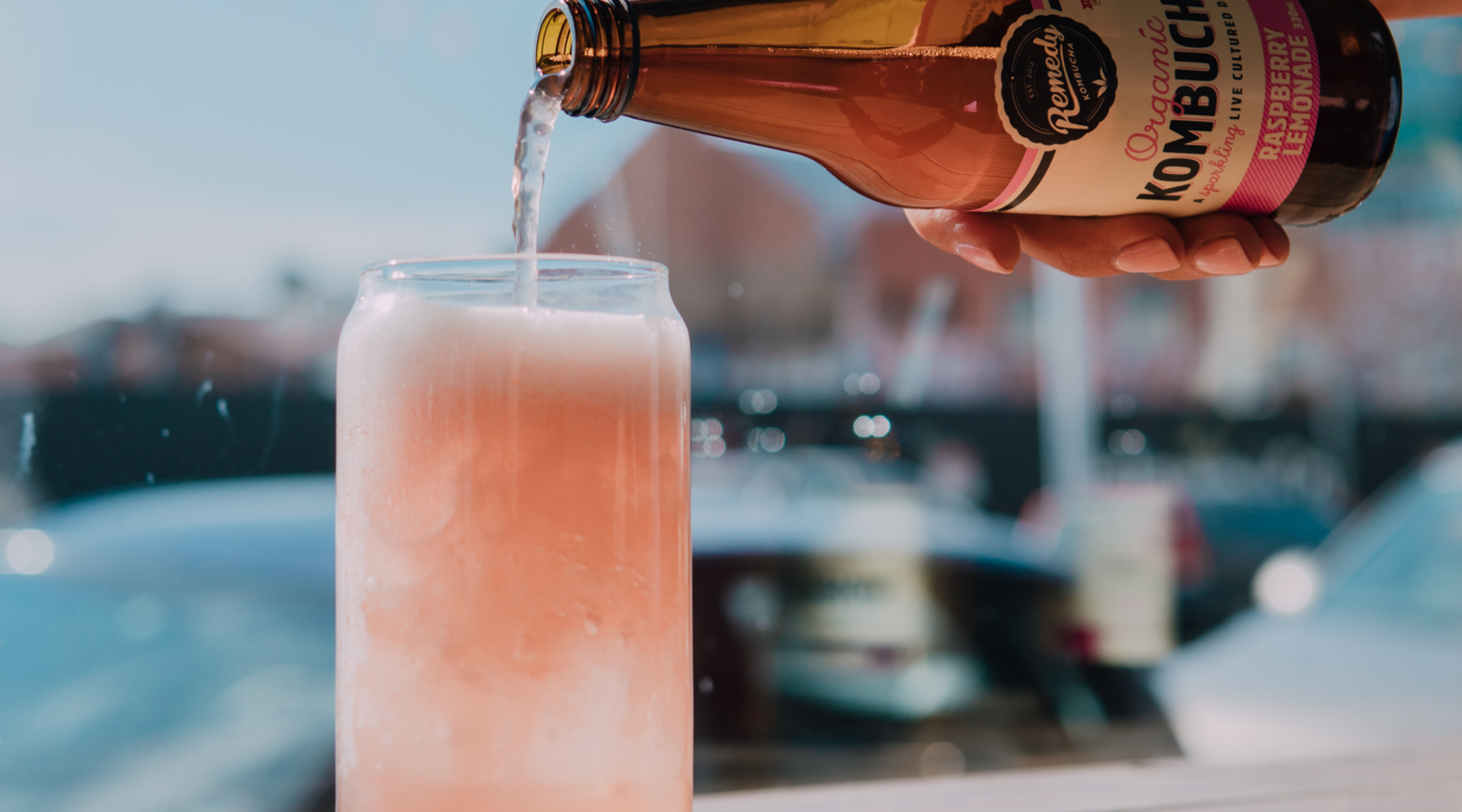When kombucha is made the traditional way, and is kept raw and unpasteurised like Remedy, it means it is full of live cultures, organic acids and antioxidants, which all have proven health benefits.
For anyone who thinks that kombucha is nothing more than a drink for hipsters, this effervescent tonic was around well before that word made its way into common parlance. From its conception 2,000 years ago in China to its prevalence on the supermarket shelves of today, the presentation and packaging of kombucha might have changed since its ancient beginnings, but its nature has remained largely the same. Thought to aid digestion and gut health via the billions of good bacteria cultivated in the fermentation process, this bubbly beverage has been credited as a kind of miracle drink in health circles. Not as widely discussed, however, is how the various processes and ingredients that go into creating a bottle can vastly affect how beneficial it really is for us. With more and more companies jumping on the bandwagon and the market becoming saturated with brands more focused on profit and less on health, we spoke with the founders of a recent arrival on the scene, Remedy Kombucha (one of the only labels on the market to boast no sugar naturally), to understand just how much one kombucha can vary from another.
Kombucha is fermented tea, so naturally, the process of creating it must start with a brew. At Remedy, they use organic, single origin tea leaves to ensure the health benefits of the final product start with the first step. During this time, polyphenols — a type of antioxidant — are produced in high quantities. Different makers use different methods, but as far as ensuring the kombucha retains the probiotic qualities that make it so important to our digestive systems, it pays to look out for brands that keep their ‘booch’ raw and unpasteurised. Pasteurisation, often used to save time and money when bottling and storing, kills the live cultures and bacteria, draining the drink of its essential goodness. Remedy’s Co-founder Emmet Condon explains that their raw kombucha is “the healthiest because it is brewed in small batches according to old-school traditions.” It’s a process that allows them to brew out all the sugar and end up with a drink that is packed with live cultures and organic acids which, according to the experts, ‘are proven to improve gut health and overall wellbeing’.
Once the tea is brewed, a mother culture or SCOBY (symbiotic community of bacteria and yeast) is added, which kicks off the fermentation. The quality of the SCOBY will have a bearing on the kombucha’s final pH, residual sugar and alcohol content. “We are still using the very same mother we started with which has been brewing kombucha in Australian homes for the past 40 years” explains Condon, clarifying that the longevity is “a sign of a very healthy culture.” It then takes 30 days for the drink to fully ferment, before natural flavour (from organic fruits, roots and spices) is added and the bottles are sent on their way.
Other ingredients are also important to consider before determining which kombucha to pluck from the fridge. Some brands take a less holistic approach to their product than others, and it can be easy to find yourself sucked into the idea of it all without actually checking if something is as good as it claims to be. So it pays to be a bit discerning and check the ingredients before jumping on the bandwagon. “Consumers love the health benefits” explains Condon, “but we also consistently hear that they love the taste”. For Remedy, the aim of the game is to “offer consumers real and healthy alternatives to sugary drinks and fake-healthy drinks with no nutritional value” by using all-natural and organic ingredients, which not only make for a much cleaner brewing process, but also result in a kombucha that is truly committed to health — rather than just the trendy nature of it.
This idea is furthered when it comes to the contentious issue of kombucha’s sugar content. With some basing their claims that the drink isn’t all it’s hyped up to be on the sugar content of each bottle, this doesn’t apply in every case. Yes, some brands do end up with a fair amount of residual sugar in their product, which not only wreaks havoc for the obvious reason that too much sugar is bad for us, but can also mean that the kombucha continues to ferment on the shelf. The amount of sugar left in a batch of kombucha really comes down to how long it has been fermented for. Because Remedy allows its kombucha to ferment for 30 days, all the sugar added at the start (necessary for the SCOBY to feed on) is entirely consumed, resulting in a final product that naturally contains no sugar (Remedy’s product even has the ‘I Quit Sugar’ tick of approval). If a kombucha is fermented for, say, five days, there will naturally be more of the sweet stuff left over.
There are a number of factors that go into creating the bottles of kombucha we happily sip on. What Remedy Kombucha has illuminated for us, is that not all kombucha is created equal. As Condon puts it, “kombucha isn’t a ‘cure’ but it can help return your body to balance by improving gut health and overall wellbeing. When kombucha is made the traditional way, and is kept raw and unpasteurised like Remedy, it means it is full of live cultures, organic acids and antioxidants, which all have proven health benefits”. So be wary of the booch you buy into. While brands like Remedy have made health their mission, others may not be as beneficial. Our advice? Trust your gut.







